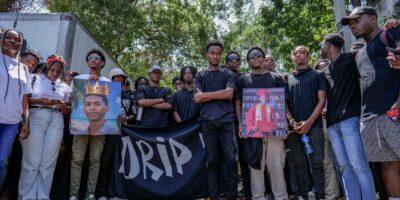Kenyan officers reveal their internal frustrations to AyiboPost
On paper, Haiti is benefiting from a Multinational Security Support Mission (MSSM), launched in June 2024.
But on the ground, it’s the Kenyans—just over 1,000 in the country—who are on the front lines in the fight against gangs.
Several hundred officers from foreign countries—Guatemala, El Salvador, Belize, Jamaica, and the Bahamas—have arrived in Haiti.
These additional officers focus on securing infrastructure and evacuating the wounded.
They leave the dangerous task of gang operations to the Kenyans, who face increasingly sophisticated, heavily armed, and violent criminals.
This division of labor, along with controversial strategic decisions, has created tensions following the killing of two Kenyan officers in the Artibonite region this year. Gangs also wounded two other Kenyans in July 2024 and in March 2025.
Three mission officers agreed to speak to AyiboPost anonymously. They complain about poor working conditions, operational strategies they don’t understand, and unequal treatment among personnel.
The lack of commitment from other nations in reclaiming gang-controlled territories tops their list of concerns. “The entire burden falls on us,” a Kenyan officer told AyiboPost.
Even within the Kenyan contingent, task distribution is problematic.
According to the testimonies gathered, the selection of field-deployed agents is influenced by personal ties to those in charge. “Some call themselves ‘specialists’ and don’t go on patrols. They handle secondary tasks,” one officer adds.
Another agent confirms these claims: “It all depends on who you know. Some avoid operations and receive special treatment.”
The Kenyan officers interviewed by AyiboPost also criticize the poor quality of most of the equipment made available to them, as well as the lack of more appropriate tools—like proactive aerial support.
Two of the officers question the decision to spread troops across multiple fronts and accuse mission leadership of launching actions without the necessary support—putting Kenyan forces at risk.
This strategic posture has reportedly contributed to the failure of several operations. “The commander changed everything. He deploys teams far from the capital, to places like Pont-Sondé or Pétion-Ville, while neighborhoods near the airport are still under gang control,” a Kenyan officer explains.
The mission’s spokesperson, Jack Mbaka, confirmed that other nations are handling “static security.” According to him, discussions are underway about involving more countries in operations.
Vehicle and equipment issues are part of an ongoing process, Mbaka adds. Armored vehicles often break down and are also targeted by gangs. “You can’t expect them to always be operational,” he says.
The spokesperson did not address the other concerns. The mission’s internal regulations strictly forbid officers from speaking to the media under penalty of disciplinary action, Mbaka said.
According to him, any information obtained outside of the mission’s strategic communications office could be rumor or misinformation.
The mission’s spokesperson, Jack Mbaka, confirmed that other nations are handling “static security.” According to him, discussions are underway about involving more countries in operations.
Despite being present on Haitian soil for over ten months, the multinational mission has struggled to stem the surge in violence.
In March, tens of thousands of citizens protested in Port-au-Prince against the failure of the security strategy and demanded the resignation of the Presidential Council, whose mandate ends in February 2026.
The Council’s president, Fritz Alphonse Jean, announced the implementation of a so-called war budget and the recruitment of members from a brigade known for its involvement in crimes and human rights violations to fight the gangs.
“The mobilization of the Protected Areas Security Brigade is a major scandal,” said Me Samuel Madistin, executive director of the Je Klere Foundation, to AyiboPost.
“The BSAP,” the human rights advocate continued, “is not recruited, trained, drilled, or armed by the state. According to Madistin, it’s an official armed gang with no discipline, no hierarchy, and no training, serving politicians and mafia groups. It’s the worst decision the council could make to try to fight insecurity.”

In the foreground, three BSAP officers are standing with their backs to the camera on a field. Photo: Jean Feguens Regala for AyiboPost.
But the authorities are running out of options. Haiti is facing cuts in humanitarian aid and lacks funding for the multinational mission.
The country can no longer rely on its police force, which suffers from chronic understaffing: in 2023, 1,663 police officers quit, in addition to over a hundred others who were killed.
The force numbered 13,196 officers as of December 2023, but that number has significantly decreased this year.
Gangs now control nearly 90% of Port-au-Prince, in a context where violence has already displaced more than one million citizens.
On March 31, gang members claiming to be from 400 Mawozo and Jeff Canaan attacked Mirebalais, a strategic city in the Central region, near the Dominican Republic border and home to the Mirebalais University Hospital (HUM).
Furthermore, the health system is on the verge of collapse following the temporary closure of HUM, amid repeated violent gang attacks in and beyond the metropolitan area of Port-au-Prince.
Only 37% of hospitals are still functioning.
Doctors Without Borders announced Tuesday that it was closing two hospitals in Turgeau and Carrefour due to worsening security conditions in Port-au-Prince.
Additionally, half the country is facing food insecurity.
Kenyan agents fear the situation will worsen if urgent reforms are not implemented within the mission. They say they have, along with other officers, raised their concerns internally to no avail. “They simply told us not to lose hope,” one agent reports. “But nothing has changed.”
By Widlore Mérancourt & Wethzer Piercin
Cover : Photos of Kenyan soldiers arriving at Toussaint Louverture Airport in Haiti. Photo : Jean Feguens Regala pour AyiboPost
► AyiboPost is dedicated to providing accurate information. If you notice any mistake or error, please inform us at the following address : hey@ayibopost.com
Keep in touch with AyiboPost via:
► Our Channel Telegram : Click here
► Our Channel WhatsApp : Click here
► Our Community WhatsApp : Click here







Comments